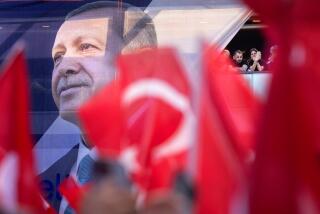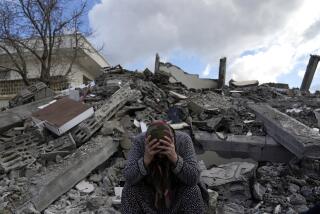Turkey Looks South, and Worries
ANKARA, Turkey — Turkish officials are watching with alarm, and rattling a few sabers, as ethnic Kurds gain strength in northern Iraq -- but their ability to react militarily is limited, analysts say.
Turkey worries that if Kurds in its southern neighbor become powerful enough, they will declare an independent state. In light of the history of troubled relations with its own Kurdish minority, official Turkey fears that independence for Kurds in Iraq would inspire Kurds in Turkey to seek the same.
Kurds in Iraq already enjoy a certain amount of political autonomy, and Kurdish officials there are working to settle Kurds back into oil-rich Kirkuk -- the north’s crown jewel -- and other cities and towns in the region. Tens of thousands of Kurds were driven out years ago by Saddam Hussein’s regime in a plan to “Arabize” the north, resulting now in the displacement of many Arabs.
In meetings with U.S. Secretary of State Colin L. Powell, his British counterpart, Jack Straw, and numerous other world leaders, Turkey has repeatedly warned against what it calls the Kurds’ destabilizing actions.
“Kirkuk is a city that belongs to all Iraqis, and all of Iraq’s natural resources also belong to all the Iraqi people,” Turkish Foreign Minister Abdullah Gul told reporters this month, in what some saw as a veiled threat. “If harm comes to these [principles], then harm will come to peace in all Iraq.... There should be no provocative acts aiming to maximize [the Kurds’] status or strengthen their position.”
Turkey is also protesting the continued presence of Kurdish guerrillas in northern Iraq and southern Turkey, where violence has begun to resurge after a long lull. The government has asked the United States to make good on what the Turks see as a promise to eradicate fighters of the Kurdistan Workers Party, or PKK, which Washington and Ankara consider a terrorist group.
The U.S. has made it clear, however, that with its hands full with major offensives, ambushes and firefights in Iraq, going after the PKK is not a top priority.
In the past, Turkey might have moved militarily to quell signs of a Kurdish uprising. But the government, led by Prime Minister Recep Tayyip Erdogan, has less maneuvering room than at any time in recent history.
One reason is that Turkey is pursuing membership in the European Union, a years-long process in which the country must show significant improvement in its human rights record, economy and political stability. A unilateral, armed operation in Iraq would jeopardize Turkey’s EU application, diplomats said.
The Turkish military believes that the PKK, in its current form, remains sufficiently well-supplied with explosives and missiles to pose a threat, even if the group is beset by internal battles, the loss of key leaders and the depletion of its forces. Still, its level of activity has not crossed the line that would force the army to respond.
As for the political gains of the Iraqi Kurds around Kirkuk and elsewhere, Turkish officials, despite their protests, realize the enormous complexity of the situation in Iraq. They are reluctant to send their own troops into the morass, analysts said, a move that would meet with a fair amount of domestic opposition.
“Everyone here sees Iraq as an unmitigated disaster -- why get involved?” said a European diplomat in Ankara, the capital. “You’ll hear the usual rhetoric, but Turkey has accepted the semi-federation of Iraq. Not with great joy, but that’s the reality on the ground.”
Turks are further constrained by their diminishing influence on Washington. Many Bush administration and other U.S. officials have not forgiven Turkey for its refusal in a March 1, 2003, parliamentary vote to allow the U.S. to launch its invasion of Iraq from Turkish soil.
These officials argue that if Turkey had cooperated, the U.S. could have deployed larger numbers of troops and been better able to battle the insurgency that spread after Hussein’s fall.
“Had they taken a different route on March 1, the situation would be different,” a Western diplomat in Ankara said. “Turkey would have a seat at the table. Turkey would have a major role.”
Instead, Turkey does not seem to have Washington’s full attention when it complains about Kurds, the PKK or other issues.
Military analyst Faruk Demir said Turkey was aware that its hands were tied and was willing, for now, to stand down. But Turkish officials could eventually lose patience with what they see as U.S. inertia, especially if Kurdish rebels stage a major attack in urban centers or Iraqi Kurds go too far in changing the demographics of Kirkuk.
What exactly the trigger might be is a matter of conjecture.
“Turkey won’t want to do anything unilaterally and would always prefer to have the Americans on board,” Demir said. “At some point, though, they won’t be able to stand by and watch.”
More to Read
Sign up for Essential California
The most important California stories and recommendations in your inbox every morning.
You may occasionally receive promotional content from the Los Angeles Times.









